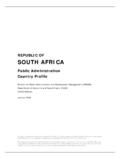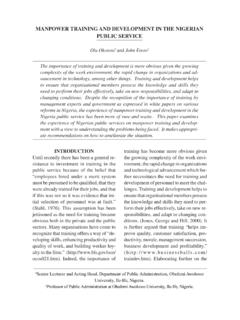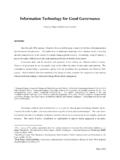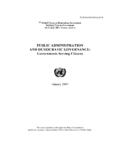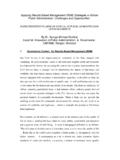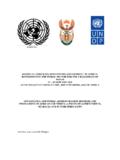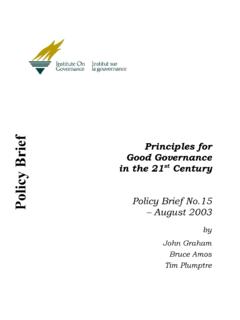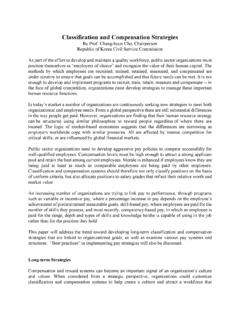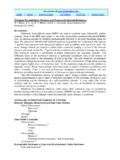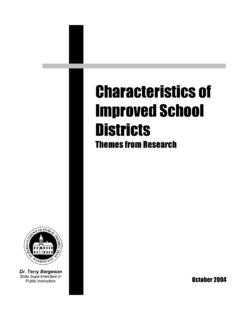Transcription of Financial Management for Improved Public Management …
1 UNITED. NATIONS ST. Secretariat Distr. LIMITED. ST/ 14 July 1995. ENGLISH ONLY. TWELFTH MEETING OF EXPERTS ON THE. UNITED NATIONS PROGRAMME IN Public . ADMINISTRATION AND FINANCE. New York, 31 July-11 August 1995. Financial Management FOR Improved Public . Management AND DEVELOPMENT*. CONTENTS. Paragraphs Page INTRODUCTION .. 1 - 8 2. I. THE SCOPE OF GOVERNMENT Financial Management .. 9 - 20 3. II. GOVERNANCE ISSUES AND Public Financial Management .. 21 - 33 5. III. Public Financial Management AND GOVERNANCE .. 34 - 56 8. IV. FISCAL AND STABILIZATION OBJECTIVES .. 57 - 81 11. V. BUDGET AND Public EXPENDITURE PROCESSES .. 82 - 96 17.
2 VI. Financial INFORMATION SYSTEMS .. 97 - 101 20. VII. DEVELOPMENTS IN THE LONGER TERM .. 102 - 121 21. VIII. CONCLUSION .. 122 - 125 24. _____. ST/ English Page 2. * Prepared by Mr. Graham Scott, consultant to the Department for Development Support and Management Services of the United Nations Secretariat;. views expressed are those of the author and do not necessarily reflect those of the United Nations. 95-21123 (E) 240795 /.. *9521123*. /.. ST/ English Page 3. INTRODUCTION. 1. The subject of the present paper, " Financial Management for Improved Public Management and development", is framed within the wider context of the special resumed session of the General Assembly on Public administration and development.
3 Accordingly, the focus is on Financial Management as a critical component of the total system of Public administration and the role that it can play in implementing Governments' policies to promote national economic, social and other developmental goals. 2. The many alternative methods for Public Financial Management and the mechanics of their implementation are not elaborated upon in the present paper;. these technical topics are the subject of many excellent publications readily available in both developing and industrialized countries. 3. Further, it is recognized that each Public administration has its own unique set of legislation and accountability requirements.
4 Consequently, at the theoretical level no one method of Public Financial Management will satisfy the specific needs of a government better than any other. It is only in practice that an optimal system of Public Financial Management can be determined. The responsibility for making that practical determination rests squarely with each Government. 4. The approach taken in the present paper is to emphasize the role of Public Financial Management in support of Public administrative reforms that meet developmental needs; the individual system of Public Financial Management and the different mechanisms and approaches by which that can be achieved, are not as relevant as the principles of Public administrative reform that they help to put and keep in place.
5 5. The quality of any decision taken is entirely dependent on the nature of the information made available. It is well known that timely and reliable Financial data guide the formulation of policy, and also initiate operational reforms; given the emphasis on reform in the present paper, that elementary point cannot be overstated. 6. In the absence of reliable Financial data, decision makers are often compelled to rely on information that is outdated and incomplete or even anecdotal evidence when making crucial strategy determinations. This affects not only the quality of the decision that is reached most immediately but also the reliability that decision makers can place on their data sets, which serves /.
6 ST/ English Page 4. to undermine the confidence that policy makers have in the decision formulating process itself. 7. Where the reliability of data is suspect, the forward range of forecasts shorten and the scope of reform narrows into that area for which the data sets are accurate. At worst, reform is restricted to only those changes that will do the least damage in the event that the supporting data proves to be totally inaccurate. 8. By indicating that the availability of high-quality Financial data is a decisive element in the process of Public administration reform, the present paper alludes to one of the most elementary Public reform issues that needs to be considered: how does a government establish a system to evaluate its Financial Management systems so that it can be fully familiar with the technical requirements of creating reliable data flows for its own use?
7 As indicated earlier, the response to that question will be determined by unique issues at play in each country. I. THE SCOPE OF GOVERNMENT Financial Management . 9. The core of government Financial Management is generally taken to be budget planning and preparation, appropriation by the legislature, budget implementation, accounting and Financial reporting; audit and evaluation is commonly but not always added to this list. 10. A description of Public Financial Management can be found in many publications. The following descriptions are typical: (a) Financial Management is defined as encompassing all or part of the processes and functions of planning and programming, budgeting, budget execution and accounting, and audit and evaluation.
8 (b) The object of Financial Management is to ensure that, to the maximum practical extent, the resources entrusted to it are acquired and used lawfully, efficiently and effectively. 11. To be effective, this process requires reliable costing information from an integrated Financial Management process. The principles normally cited as a guide to Financial Management reform are: (a) Use a structured planning and programming process for evaluating and /.. ST/ English Page 5. choosing alternatives for achieving desired objectives;. (b) Make resource allocation decisions within a unified budget;. (c) Integrate budgeting and accounting.
9 (d) Use accounting principles that match the delivery of services with the cost of the services;. (e) Encourage Financial accountability;. (f) Measure outputs as well as inputs;. (g) Prepare consolidated reports. 12. It should be emphasized that sound Financial Management requires a firm foundation in Financial information, which can be achieved by establishing an integrated system of budget formulation, budget execution and accounting that focuses on the costs of past and future decisions. 13. The above-mentioned principles do not take into account the major contributions that a capable system of Public Financial Management will bring to the processes of structural reform, organizational change, corporatization, or privatization.
10 While Financial accountability and measuring both outputs and inputs are encouraged, it is clear that such principles do not focus on a wider Public administrative reform framework, based on performance incentives for the achievement of outputs and outcomes. 14. Notwithstanding the narrower scope granted by typical approaches to Public Financial Management , the field is frequently identified as a key component within the wider systems of Public resources Management and policy formulation, alongside development programming and personnel and property Management systems. 15. The integrated concept of Public Financial Management is advocated in literature concerned with international development.
